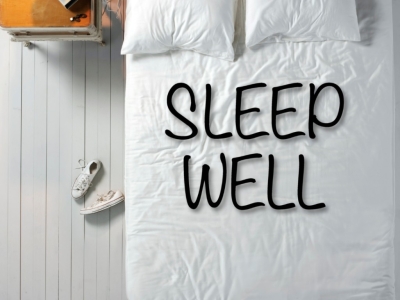
Sleep and Immunity
Antibiotics, herbs, diet, bio resonance, oxygen therapy ... there are many traditional and alternative methods of fighting Lyme disease. However, lifestyle and sleep quality are rarely discussed.
Sleep is a physiological activity that we spend an average of about 30% of our time. Assuming the average person lives about 80 years, the same amount of sleep is about 25 years of our lives!
Sleep functions
The main function of sleep is primarily the regeneration of our body. That is why in the morning we have the most energy, our body is rested, and the brain is oxygenated. Lack of sleep impact negatively the memory, effective learning or proper concentration. Studies are also increasingly showing the effects of sleep on mood, including anxiety and depression. Too short sleep phases cause disturbances in the secretion of cortisol, the stress hormone, but also many sex hormones, which translates into the functioning of the whole organism. A man who sleeps an average of 4-5 hours a day has reduced testosterone levels equal to a man 10-15 years older.
Sleep and the immune system
Can sleep have a real impact on Lyme disease and its co-infection? Absolutely. sleep affects our immune system, and its deficiency causes:
- Decreased T cell activity .
- Increased levels of inflammatory cytokines.
- Decrease in leukocyte production.
- Weakening of the function of NK cells, which are responsible for fighting pathogens in the body (including Borrelia torticollis and cancer cells).
- Inhibition of melatonin secretion by the pineal gland.
Phases of sleep:
Sleep is a very complex physiological activity in which two main phases can be distinguished: NREM (non - rapid eye movement) and REM (rapid eye movement).
The NREM phase is longer and is mainly responsible for rest and regeneration. The REM phase, on the other hand, is more active, the brain is more stimulated and sleep dreams occur. For proper functioning and full strength, it is necessary that both phases "live in symbiosis". Each cycle should last on average approx. 100 minutes and alternate (approx. 4-6 sleep cycles).
How long should we sleep?
The average, desired length of sleep depends mainly on age and is:
9-12h for school children (7-12 years)
8-10h for teenagers (13-17 years)
7-9h for adults (18-64 years)
7-8h for the elderly (65+)

Methods for improving the quality of sleep
1. Do not use extensively cellphones or computers after dark.
A phone call in the bedroom or an episode of a TV show in bed is a bad idea. The pineal gland then gets the information that it's not night at all and inhibits the secretion of melatonin, called the sleep hormone. Limit contact with red light (light produced by electronic devices) for at least an hour before bedtime.
2. Maintain proper bedroom conditions.
The right temperature, darkness, silence or natural, comfortable nightwear will be key here.
3. Be systematic.
You should always go to bed and get up at the same time. Thus, you accustom the body to the established schemes. The optimal amount of sleep is ok. 21-23 and wake up. 6-8.
4. Don't eat at night.
Eating before bed can interfere with the quality of sleep. The best option will be to eat the last, easy-to-digest meal at least 2 hours before bedtime. The same applies to strong black tea and coffee.
5. Avoid physical activity in the evening.
Physical activity can help with sleep problems, but it should not be done too late. Doing a workout before going to bed, in addition to a loud, heavily lit gym, can cause excessive stimulation of the body and the release of cortisol - the stress hormone, which can cause problems with sleep, and later with the quality of sleep. Take care of walking, oxygenation and contact with nature.
6. Don't drink alcohol.
"Alcohol makes it easier to fall asleep" - you can often meet this popular opinion. However, alcohol, even in small amounts, can cause a significant reduction in the phase of REM sleep, and even its complete suppression.
7. Herbs, supplements and medicines
Only when you change your habits and follow all of the above points, and you do not see improvement you should consider supplementation. Adaptogens are very helpful in calming down before bed, especifically Ashwagandha. In addition, plant ingredients such as Melissa or saffron can also be effective. Melatonin should come last, but don't take it for long.
8.Meditation
Focusing on breathing and being aware of the moment can also help with sleep problems. According to a recent study, people who meditate regularly have fewer problems with insomnia, fatigue and depression.
Adequate sleep and a broadly defined healthy lifestyle are very important in the treatment of Lyme disease. Sleep quality and lifestyle affects our immunity, and therefore the body's ability to fight Borrelia bacteria.

 Boosting Your Libido Naturally with Herbal Supplements
Boosting Your Libido Naturally with Herbal Supplements
 Unlocking Energy Potential: Shilajit's Impact on ATP Production and Vitalit
Unlocking Energy Potential: Shilajit's Impact on ATP Production and Vitalit
 Collagen's Role in Lyme Disease Recovery: Understanding Its Vital Benefits
Collagen's Role in Lyme Disease Recovery: Understanding Its Vital Benefits
 Helicobacter Pylori- Natural Treatment
Helicobacter Pylori- Natural Treatment
 Sleep and Immunity
Sleep and Immunity